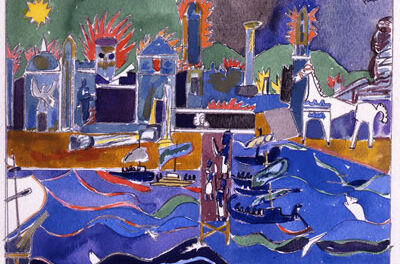The powerful massed choirs of the Davidson College Chorus and the Davidson Singers and the Choral Arts Society of Davidson, totaling over 120 strong voices, joined forces with the Davidson College Pro Arte Orchestra (most of whom also play in the excellent Charlotte Symphony Orchestra) to present two highlights of the choral repertory under the enlightened direction of Christopher Gilliam. Written some six decades apart, each masterpiece deals with lofty themes involving man’s relationship to God or Eternity and the price man pays for the excesses of pride, vanity, or pleasure.
The first of the two works which comprised the entire program was the Prologue to Mefistofele, a preface to the lengthy opera in four acts by the Italian composer Arrigo Boito (1842-1918), perhaps better known as the brilliant librettist* for the last two of Verdi’s operas,Otello and Falstaff. Although Mefistofele is still occasionally performed in its entirety, the Prologue is much more popular, involving large quantities of brass instruments, a massive chorus, and originally a children’s chorus, here sung by a portion of the sopranos, as well as the powerful bass voice of Mephistopheles himself.
This role was sung by Patrick Scully, a 2012 alumnus of Davidson College and currently a doctoral student at Northwestern University. He sauntered on stage, with a devil-may-care attitude (belittling the Creation, “piccina terra” [tiny earth]), and sang his challenge to God to save Faust, with whom he will then drive a bargain for Faust’s soul in exchange for the temporal pleasures of youth. Although visibly younger than the Devil he is meant to impersonate, and sounding even younger, Scully inhabited the role well, with a knowing insouciance and sneer.
Boito composed this Prologue with a vision of duality (or philosophical dualism); stentorian brass proclamations alternate with celestial sounds of flutes and harp, lamentations in minor modes juxtapose triumphant major passages. The brass playing was outstanding throughout the concert. The audience expressed its approval with a standing ovation.
William Walton (1902-1983) achieved notoriety in his early twenties with Façade, a musical setting with rhythmically recited poems by Edith Sitwell, a member of a wealthy and eccentric family of artists – close friends of Walton in his younger years. Another Sitwell, brother Osbert, undertook to compile a libretto from the scriptures, mostly from the book of Daniel, with excerpts from Isaiah, the Psalm 137 and the Book of Revelation for what was originally meant to be a small work for chamber ensemble and vocal soloists. However, the subject of the fall of Babylon and the death of Belshazzar lends itself to the very idea of extravagance, and the final work, Belshazzar’s Feast, is an orgy of some 35 minutes of choral and orchestral opulence. Scully sang the key narrative bridges between the three large sections of the work dramatically.
Maestro Gilliam is a faculty member of Davidson College and responsible for the choral ensembles, which were very impressive. He directed the entire concert with precision and clarity. The treacherous mixed meters of the Walton were seamless and most orchestral attacks were clean. Even though the ensemble was widely spread out and involved nearly 200 people, Gilliam chose not to use a baton. However, the uniformly large beat, if lacking in subtlety, was at least easily visible and effective.
Although both works were magnificently presented, I could not suppress the feeling that presenting them both together detracted from each, so similar are they in format, material, and subject. Imagine how a short Baroque cantata or Stravinsky work (Les Noces?) might have set up the works in a different light.
I was quite impressed by the pre-concert talk of Davidson faculty member and Davidson orchestra conductor Tara Villa Keith for DavidsonLearns, a partnership in lifelong learning. Her musical examples were supported by visuals that were fascinating. Brava!
*”It is difficult to say… whether Boito will be able to give Italy any masterpieces! He has much talent, aspires to originality, but succeeds only in being strange. He lacks spontaneity, and he is short on melody; many musical qualities. With these tendencies, he can have some success with a subject as odd and theatrical as Mephistopheles.” — Giuseppe Verdi letter of March 21, 1877, quoted in the program notes of the Metropolitan Opera, p. 45, 2018-19 season.











